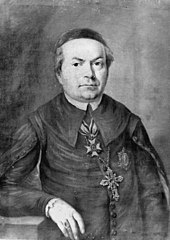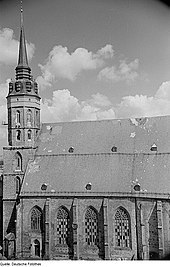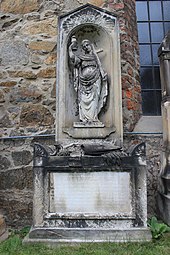Franz Georg Lock
Franz Georg Lock ( Upper Sorbian Franz Jurij Lok ; born October 3, 1751 in Wittichenau , † September 7, 1831 in Bautzen ) was dean of the Catholic chapter of St. Petri in Bautzen and Apostolic Prefect of the Diocese of Meissen in both of them from 1796 until his death Lausitz . Lock, who also received episcopal ordination, is considered to be the most important representative of the Enlightenment among the Sorbs and a supporter of liberal reform efforts in the Catholic Church.
Life
Franz Georg Lock was the son of a Sorbian master shoemaker. On the recommendation of his home pastor Martin Nugk , he was sent to the Wendish seminary in Prague in 1765 to complete the grammar school in the Bohemian capital and from 1771 to study theology. In 1776 he was ordained priest there in St. Vitus Cathedral .
Martin Nugk, who had meanwhile become cathedral dean, appointed Lock as cathedral vicar to the Petridom in Bautzen. There he soon distinguished himself as a preacher and catechist. In 1796 he received the post of canon and was elected dean of the chapter that same year. He was also prefect of the Catholic Church in both Lusatia. Lock enjoyed the esteem of the Saxon Elector and later King Friedrich August , who therefore applied to Pope Pius VII to have him ordained bishop. The Pope consented and appointed Lock titular bishop of Antigonea in 1801 ; the episcopal ordination took place in the same year by Bishop Wenzel Leopold Chlumčanský of Přestavlk in Prague. In 1811, Lock submitted proposals to the Saxon court for the renewal of a Catholic regional bishopric in Saxony. The re-establishment of the Meissen diocese did not take place for financial and political reasons and was only started 110 years later.
In 1821 Pope Pius VII subordinated the parts of Lusatia that had fallen to Prussia in the course of the Congress of Vienna to the Archdiocese of Breslau with the bull De salute animarum . The jurisdiction of the Bautzen prefecture was henceforth limited to the Saxon part of Upper Lusatia, but it only lost two parishes, Neuzelle and Wittichenau, the home parish of Locks.
In addition to his spiritual duties, Bishop Lock was particularly interested in education. He took care of the improvement of the school system in the villages belonging to the cathedral monastery, whereby he promoted the Protestant village schools as well as the Catholic ones. In 1802 he wrote new school regulations for all educational establishments in his district. The bishop also had some textbooks and prayer books published for the Catholic youth. Lock paid particular attention to the Wendish seminary in Prague, in which he himself had lived for a decade. There he intensively promoted the language studies of the Sorbian priesthood candidates. For example, he approved a weekly linguistic college held by the eminent Slavist Josef Dobrovský . Lock had been in friendly contact with him since they were studying together in Prague. In 1824 Lock appointed the Czech Bolzano pupil Franz Prihonsky (1788-1859) as president of the Wendish seminary. He increased the library of the Prague Institute through his own purchases as well as through the mediation of donations and bequests. Lock also enlarged the library of the cathedral monastery in Bautzen with numerous new acquisitions. As a theological representative of the Catholic Enlightenment, he mainly collected church reform literature and educational work, but also children's and youth literature . Canon Franz Prihonsky created new catalogs for the library on his behalf. In 1824 Lock became a member of the Upper Lusatian Society of Sciences .
In 1819 Lock consecrated the newly appointed Vicar Apostolic for Saxony Ignaz Bernhard Mauermann in Dresden as bishop. After Lock's death in 1831, he was also his successor as cathedral dean and prefect in Upper Lusatia. Franz Georg Lock was buried in Bautzen in the Nikolaikirchhof .
As a liberal and tolerant cleric, as a man who did not ask much about Rome, Lock was also generally recognized among the Saxon Protestants, which was expressed in various exuberant tributes to his golden jubilee as a priest and in the obituaries. This esteem was viewed with suspicion by the Catholic side. Lock's effect as a Catholic enlightener is based primarily on his practical work as an educational reformer and the support of reform-oriented personalities such as Bernard Bolzano , Josef Dobrovsky and Franz Prihonsky. Lock did not leave his own scientific writings behind; In the Bautzen cathedral monastery archive only one manuscript from Lock has survived, in which the bishop deals with the use of the vernacular in the Catholic liturgy.
literature
- Nekrolog in the New Lusatian Magazine . Volume 10, 1832, pp. 117-120 ( digitized version ).
- Rudolf Kilank: Franz Georg Lock. A contribution to the Catholic Enlightenment in Upper Lusatia. Dissertation, Berlin (East) 1970.
- Erwin Gatz (ed.): The bishops of the German-speaking countries 1785/1803 to 1945. A biographical lexicon. Duncker & Humblot, Berlin 1983, ISBN 3-428-05447-4 , p. 457.
- FG Lock episcopo Antigonensi… sacerdotium quinquaginta annorum pie congratulations clerus capituli Budissini. Budissae 1826. (Commemorative publication for the 30th anniversary of Lock's election as dean of the cathedral)
Web links
Individual evidence
- ↑ Hans Friedrich Fischer: The re-establishment of the Meissen diocese in 1921 and its prehistory. Leipzig 1992, p. 49.
- ↑ Bernhard Fabian (Ed.): Handbook of the historical book inventory in Germany. Volume 17/18: Saxony: AZ. Hildesheim 1997, p. 71 ( digitized version )
- ↑ Nekrolog in the New Lusatian Magazine . Volume 10, 1832, pp. 117–120, especially p. 120 ( digitized version )
| predecessor | Office | successor |
|---|---|---|
| Wenzel Kobalz |
Apostolic Prefect of Lusatia 1796–1831 |
Ignaz Bernhard Mauermann |
| personal data | |
|---|---|
| SURNAME | Lock, Franz Georg |
| ALTERNATIVE NAMES | Lok, Franc Jurij (Sorbian) |
| BRIEF DESCRIPTION | catholic bishop |
| DATE OF BIRTH | October 3, 1751 |
| PLACE OF BIRTH | Wittichenau |
| DATE OF DEATH | September 7, 1831 |
| Place of death | Bautzen |



